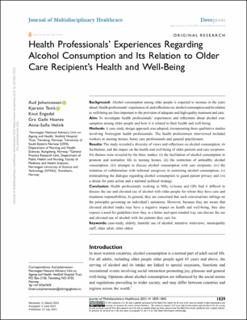| dc.contributor.author | Johannessen, Aud | |
| dc.contributor.author | Tevik, Kjerstin Elisabeth | |
| dc.contributor.author | Engedal, Knut | |
| dc.contributor.author | Haanes, Gro Gade | |
| dc.contributor.author | Helvik, Anne-Sofie | |
| dc.date.accessioned | 2022-03-28T11:56:49Z | |
| dc.date.available | 2022-03-28T11:56:49Z | |
| dc.date.created | 2021-06-18T16:01:21Z | |
| dc.date.issued | 2021 | |
| dc.identifier.citation | Johannessen, A., Tevik, K., Engedal, K., Haanes, G. G., & Helvik, A. S. (2021). Health Professionals’ Experiences Regarding Alcohol Consumption and Its Relation to Older Care Recipient’s Health and Well-Being. Journal of Multidisciplinary Healthcare, 14, 1829-1842. | en_US |
| dc.identifier.issn | 1178-2390 | |
| dc.identifier.uri | https://hdl.handle.net/11250/2988006 | |
| dc.description.abstract | Background: Alcohol consumption among older people is expected to increase in the years ahead. Health professionals’ experiences of, and reflections on, alcohol consumption and its relation to well-being are thus important to the provision of adequate and high-quality treatment and care.
Aim: To investigate health professionals’ experiences and reflections about alcohol consumption among older people and how it is related to their health and well-being.
Methods: A case study design approach was adopted, incorporating three qualitative studies involving Norwegian health professionals. The health professionals interviewed included workers in nursing homes, home care professionals and general practitioners.
Results: The study revealed a diversity of views and reflections on alcohol consumption, its facilitation, and the impact on the health and well-being of older patients and care recipients. Six themes were revealed by the three studies: (i) the facilitation of alcohol consumption to promote and normalize life in nursing homes, (ii) the restriction of unhealthy alcohol consumption, (iii) attempts to discuss alcohol consumption with care recipients, (iv) the initiation of collaboration with informal caregivers in restricting alcohol consumption, (v) minimalizing the dialogue regarding alcohol consumption to guard patient privacy and (vi) a desire for joint action and a national political strategy.
Conclusion: Health professionals working in NHs, in-home and GPs find it difficult to discuss the use and elevated use of alcohol with older people for whom they have care and treatment responsibilities. In general, they are concerned that such conversations infringe on the principles governing an individual’s autonomy. However, because they are aware that elevated alcohol intake may have a negative impact on health and well-being, they also express a need for guidelines how they in a better and open minded way can discuss the use and elevated use of alcohol with the patients they care for. | en_US |
| dc.language.iso | eng | en_US |
| dc.rights | Navngivelse-Ikkekommersiell 4.0 Internasjonal | * |
| dc.rights.uri | http://creativecommons.org/licenses/by-nc/4.0/deed.no | * |
| dc.title | Health professionals’ experiences regarding alcohol consumption and its relation to older care recipient’s health and well-being | en_US |
| dc.type | Peer reviewed | en_US |
| dc.type | Journal article | en_US |
| dc.description.version | publishedVersion | en_US |
| dc.rights.holder | © 2021 Johannessen et al. | en_US |
| dc.source.pagenumber | 1829-1842 | en_US |
| dc.source.volume | 14 | en_US |
| dc.source.journal | Journal of Multidisciplinary Healthcare | en_US |
| dc.identifier.doi | https://doi.org/10.2147/JMDH.S310620 | |
| dc.identifier.cristin | 1916849 | |
| dc.relation.project | Norges forskningsråd: 319820 | en_US |
| cristin.ispublished | true | |
| cristin.fulltext | original | |
| cristin.qualitycode | 1 | |

